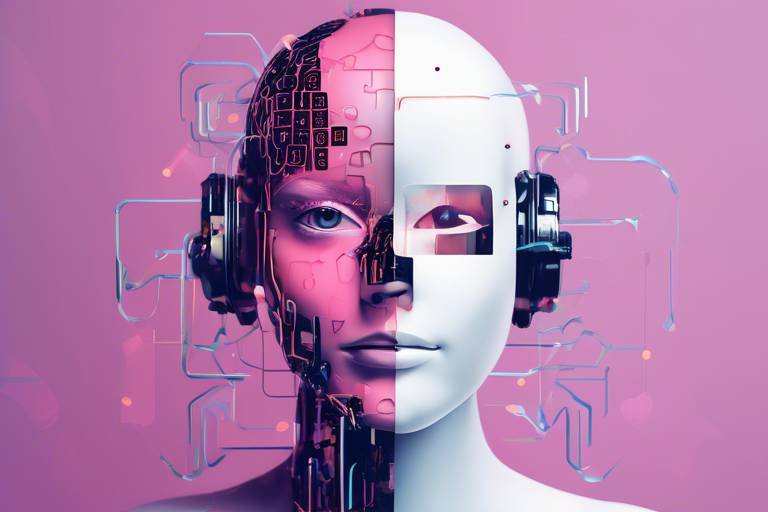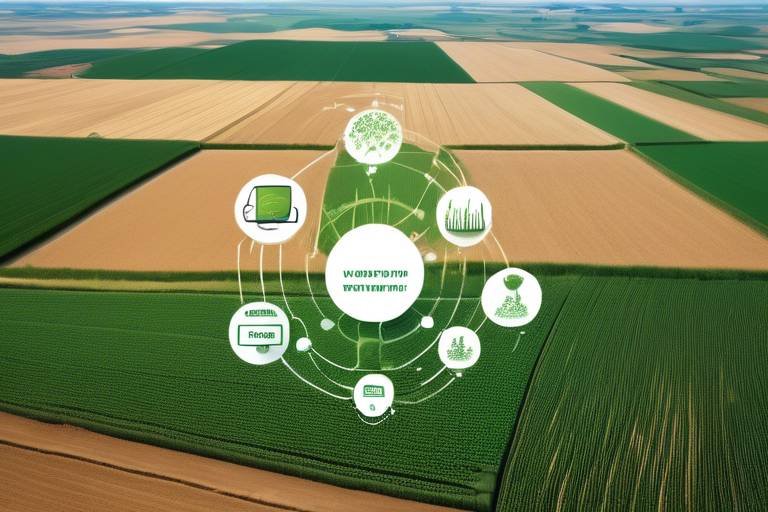The Impact of Blockchain on Healthcare
In recent years, blockchain technology has emerged as a game changer in various industries, and healthcare is no exception. This innovative technology is not just a buzzword; it is actively reshaping how we manage and secure patient information, improve care delivery, and streamline operations. Imagine a world where your medical records are not only secure but also easily accessible to authorized healthcare providers, leading to improved treatment outcomes. Sounds revolutionary, right? Well, that’s exactly what blockchain is bringing to the table.
At its core, blockchain is a decentralized digital ledger that records transactions across many computers in such a way that the registered transactions cannot be altered retroactively. This means that once data is entered, it is permanent and verifiable. In the healthcare sector, this provides a robust solution to many longstanding issues, such as data breaches and interoperability challenges. As we delve deeper into this article, we will explore how blockchain enhances data security, improves patient care, and addresses the challenges it faces along the way.
One of the most compelling benefits of blockchain technology is its ability to enhance data security. Traditional healthcare systems often rely on centralized databases, which are vulnerable to hacking and unauthorized access. However, with blockchain, patient information is stored in a decentralized manner, making it significantly more difficult for malicious actors to compromise the data. Each piece of information is encrypted and linked to a unique cryptographic hash, creating a tamper-proof record that can only be accessed by those with the right permissions.
Moreover, the transparency of blockchain means that any access to patient data is recorded and can be audited. This not only deters unauthorized access but also provides patients with peace of mind knowing that their sensitive information is protected. In an era where data breaches are becoming increasingly common, the adoption of blockchain in healthcare could be a vital step towards safeguarding patient privacy.
Blockchain technology is also paving the way for improved patient care. One of the key advantages is the ability to provide healthcare providers with accurate and real-time access to medical records. Imagine walking into a hospital and having your entire medical history available at the fingertips of your doctor, allowing them to make informed decisions quickly. This is the kind of efficiency blockchain can bring to healthcare.
With blockchain, patient records are not only easily accessible but also immutable. This means that once a record is created, it cannot be changed or deleted without a trace. Such a feature simplifies record management significantly, reducing the likelihood of errors that can occur when records are manually updated. Healthcare providers can focus more on patient care rather than getting bogged down in administrative tasks. The result? A more effective healthcare system that prioritizes patient well-being.
Another critical aspect of blockchain is its ability to foster interoperability among different healthcare systems. In a typical scenario, patient data is often siloed in various systems, making it challenging for healthcare providers to share information. Blockchain enables seamless data exchange, allowing different providers to access a patient's complete medical history regardless of where the data is stored. This improved collaboration leads to better diagnosis and treatment, ultimately enhancing overall patient care.
Blockchain not only benefits healthcare providers but also empowers patients. By giving individuals control over their medical data, blockchain enables them to make informed decisions about their health. Patients can securely share their information with providers as needed, ensuring that they receive personalized care tailored to their specific needs. This shift in control fosters a more collaborative relationship between patients and providers, which is essential for achieving optimal health outcomes.
Implementing blockchain technology can lead to significant cost savings in healthcare. By reducing administrative overhead and streamlining processes, healthcare organizations can lower operational expenses. For example, the elimination of intermediaries in data sharing can dramatically reduce costs associated with data management. Moreover, less time spent on record-keeping means more time can be devoted to patient care, which is invaluable in a field where every second counts.
Despite its potential, blockchain technology is not without challenges. Issues such as scalability and regulatory compliance pose significant hurdles to its widespread adoption in healthcare. As we explore these challenges, it’s crucial to understand that while blockchain offers revolutionary benefits, it also requires thoughtful implementation and consideration of existing regulations.
Navigating the complex regulatory landscape is crucial for blockchain adoption in healthcare. Current regulations often do not account for the unique characteristics of blockchain, leading to uncertainty for organizations looking to implement this technology. Understanding the current regulations affecting blockchain use in healthcare is essential for compliance and successful integration.
Scalability remains a significant concern for blockchain technology in healthcare. As patient data grows exponentially, the ability to process large volumes of transactions efficiently is paramount. Addressing these technical challenges is essential to ensure that blockchain solutions can accommodate the needs of a rapidly evolving healthcare landscape.
- What is blockchain technology? Blockchain is a decentralized digital ledger that records transactions across many computers securely and transparently.
- How does blockchain enhance data security in healthcare? By decentralizing data storage and encrypting information, blockchain makes it significantly harder for unauthorized access and breaches to occur.
- Can blockchain improve patient care? Yes, it allows for real-time access to accurate medical records, enhancing treatment efficiency and patient outcomes.
- What are the challenges of implementing blockchain in healthcare? Key challenges include regulatory compliance and scalability issues, which need to be addressed for successful adoption.

Enhanced Data Security
In today's digital age, where data breaches and cyber-attacks are becoming alarmingly common, the need for robust data security in healthcare has never been more critical. Blockchain technology offers a revolutionary solution to these pressing concerns by providing a decentralized approach to data management. This means that instead of storing sensitive patient information in a single, vulnerable location, blockchain distributes this data across a network of computers, making it exceedingly difficult for unauthorized users to gain access.
One of the key features of blockchain is its use of encryption. Each piece of data is encrypted and linked to the previous one, forming a chain that is not only secure but also immutable. This immutability ensures that once data is recorded on the blockchain, it cannot be altered or deleted without consensus from the network, providing a reliable audit trail. Imagine a digital vault where every transaction is locked in place, and only those with the right keys can access it. This is the essence of blockchain's security model.
Furthermore, the distributed ledger technology (DLT) inherent in blockchain means that there is no single point of failure. If one node in the network is compromised, the others remain intact, maintaining the integrity of the entire system. This is particularly crucial in healthcare, where the stakes are high, and any breach could lead to devastating consequences for patients and providers alike. The decentralized nature of blockchain not only enhances security but also builds trust among patients, knowing that their data is protected by cutting-edge technology.
However, it’s essential to recognize that while blockchain significantly enhances data security, it is not a panacea. Organizations must still implement robust cybersecurity measures alongside blockchain solutions. For instance, healthcare providers should consider the following strategies to complement blockchain's security features:
- Regular security audits to identify vulnerabilities.
- Employee training on data handling and security protocols.
- Multi-factor authentication for accessing sensitive data.
By integrating these practices with blockchain technology, healthcare organizations can create a comprehensive security framework that not only protects patient data but also enhances the overall trust in the healthcare system. In conclusion, blockchain is not just a buzzword; it is a transformative technology that promises to revolutionize how we secure patient information, paving the way for a safer and more reliable healthcare landscape.

Improved Patient Care
In the ever-evolving landscape of healthcare, blockchain technology is emerging as a game changer, particularly in enhancing patient care. Imagine a world where your medical history is just a click away, securely stored and easily accessible by authorized healthcare providers. This is not just a dream; it’s becoming a reality thanks to blockchain. By leveraging its unique capabilities, healthcare professionals can access real-time medical records, leading to improved treatment outcomes and more personalized patient care.
One of the most significant benefits of blockchain in healthcare is the ability to create an accurate and comprehensive medical history for each patient. With traditional systems, information can be scattered across various providers and facilities, leading to fragmented care. Blockchain addresses this issue by providing a decentralized ledger that securely houses all patient data. This means that whenever a patient visits a new doctor or hospital, their complete medical history is readily available, eliminating the need for repetitive tests and ensuring that providers have the information they need to make informed decisions.
With blockchain, patient records are not only easily accessible but also immutable. This means that once data is entered into the blockchain, it cannot be altered or deleted, ensuring the integrity of medical records. Imagine a scenario where a patient’s allergy information is stored securely on a blockchain; healthcare providers can trust that this information is accurate and up-to-date. This level of reliability reduces the chances of medical errors, which can have severe consequences for patient safety.
Another critical aspect of improved patient care through blockchain is its ability to foster interoperability among different healthcare systems. In a typical healthcare environment, different providers often use various systems that do not communicate with each other effectively. Blockchain bridges this gap by enabling seamless data exchange, allowing healthcare providers to collaborate more efficiently. For example, if a patient is referred to a specialist, their primary care physician can securely share relevant medical history through the blockchain, ensuring that the specialist has all necessary information at their fingertips.
Furthermore, blockchain technology empowers patients by giving them control over their medical data. Patients can decide who accesses their information and when, promoting a sense of ownership and privacy. This empowerment is crucial, as it allows patients to share their data with providers as needed, facilitating better communication and collaboration in their care journey. For instance, a patient can share their blockchain-stored health records with a new doctor instantly, ensuring continuity of care without the hassle of paperwork.
In summary, the integration of blockchain technology in healthcare is not just about improving efficiency; it’s about revolutionizing patient care. By enhancing data accessibility, ensuring accuracy, fostering interoperability, and empowering patients, blockchain is paving the way for a more connected and responsive healthcare system. As we move forward, the potential for blockchain to transform patient care will only continue to grow, making healthcare not just a service, but a truly patient-centered experience.
- What is blockchain technology? - Blockchain is a decentralized digital ledger that securely records transactions across multiple computers.
- How does blockchain improve patient care? - It enhances data accessibility, accuracy, and security, allowing for better treatment decisions and outcomes.
- Can patients control their medical data with blockchain? - Yes, blockchain allows patients to have control over who accesses their medical information.
- What are the challenges of implementing blockchain in healthcare? - Challenges include regulatory hurdles and scalability issues that need to be addressed for successful adoption.

Streamlined Record Keeping
When it comes to healthcare, the phrase "time is of the essence" couldn't be more accurate. Imagine a world where patient records are not just stored but are easily accessible and immutable. This is where blockchain technology steps in, revolutionizing the way healthcare providers manage patient records. With its decentralized nature, blockchain offers a unique solution to the age-old problem of record keeping in healthcare. Instead of relying on a single, centralized database, which can be vulnerable to breaches and errors, blockchain creates a distributed ledger that ensures every transaction is recorded and verified across multiple nodes.
One of the standout features of blockchain is its ability to reduce errors. Traditional record-keeping methods often lead to discrepancies due to human error, data loss, or miscommunication. With blockchain, each patient's record is stored in a secure, encrypted format that is not only tamper-proof but also continuously updated in real-time. This means that healthcare providers can access the most current information at any given moment, leading to more informed decision-making and better patient outcomes. Imagine a doctor being able to pull up a patient's complete medical history, including allergies, previous treatments, and medications, all at the touch of a button. This capability is not just a convenience; it can be a matter of life and death.
Furthermore, the interoperability that blockchain enables is a game changer. Different healthcare systems can seamlessly exchange data without the usual barriers that typically hinder collaboration. This means that whether a patient is visiting a specialist, a hospital, or a primary care physician, their complete medical history is readily available. The ability to share information across platforms not only enhances the efficiency of care but also fosters a more collaborative environment among healthcare providers.
To illustrate the impact of blockchain on record keeping, consider the following table that compares traditional record-keeping methods with blockchain technology:
| Feature | Traditional Record Keeping | Blockchain Technology |
|---|---|---|
| Data Accessibility | Limited access, often siloed | Instant, real-time access across platforms |
| Data Security | Vulnerable to breaches | Highly secure, encrypted, and tamper-proof |
| Error Rate | High due to human error | Minimal, as records are immutable |
| Collaboration | Difficult due to incompatible systems | Seamless data exchange |
In conclusion, the advent of blockchain technology heralds a new era in healthcare record keeping. By ensuring that patient records are secure, accessible, and accurate, healthcare providers can focus on what truly matters: delivering high-quality care to their patients. With the potential to eliminate inefficiencies and foster better collaboration among providers, blockchain is not just a technological advancement; it is a revolution in how we think about patient data management.
- What is blockchain technology? Blockchain is a decentralized digital ledger that records transactions across multiple computers, ensuring that the data is secure and cannot be altered retroactively.
- How does blockchain improve data security in healthcare? By using encryption and distributed ledgers, blockchain protects sensitive patient information from unauthorized access and breaches.
- Can blockchain technology reduce healthcare costs? Yes, by streamlining processes and reducing administrative overhead, blockchain can lead to significant cost savings in healthcare.
- What are the main challenges of implementing blockchain in healthcare? Scalability and regulatory compliance are two major challenges that need to be addressed for successful blockchain adoption in the healthcare sector.

Interoperability Solutions
In the ever-evolving landscape of healthcare, interoperability stands as a critical pillar for enhancing patient outcomes and operational efficiency. Imagine a world where different healthcare systems can communicate seamlessly, sharing vital patient information without the usual barriers. This is where blockchain technology shines, offering a solution that not only facilitates data exchange but also ensures the integrity and security of that data. With blockchain, healthcare providers can access a patient's complete medical history from various sources, including hospitals, labs, and specialists, all in real-time. This level of access is crucial, especially in emergency situations where every second counts.
One of the most significant advantages of blockchain in interoperability is its decentralized nature. Unlike traditional systems that rely on a central database, blockchain distributes data across a network of nodes, making it less vulnerable to single points of failure. Each piece of information is encrypted and linked to previous data, creating a secure chain that is nearly impossible to alter without detection. This not only protects patient data but also builds trust among healthcare providers, who can rely on the accuracy and authenticity of the information they access.
Furthermore, blockchain can help address the ongoing challenge of data silos in healthcare. Often, patient information is trapped within specific systems, making it difficult for providers to get a holistic view of a patient's health. By implementing blockchain, healthcare organizations can break down these silos, allowing for a more integrated approach to patient care. For instance, a patient’s lab results, imaging studies, and treatment history can be stored on a blockchain, enabling any authorized provider to access this information with the patient's consent.
To illustrate the potential of blockchain in fostering interoperability, consider the following table:
| Feature | Traditional Systems | Blockchain Systems |
|---|---|---|
| Data Access | Limited to specific systems | Accessible across multiple platforms |
| Data Security | Centralized, vulnerable to breaches | Decentralized, highly secure |
| Data Integrity | Prone to errors and manipulation | Immutable and verifiable |
| Patient Control | Minimal control over data | Empowered to share data selectively |
This table highlights how blockchain can significantly enhance interoperability compared to traditional systems. By facilitating a more connected healthcare environment, blockchain not only streamlines processes but also empowers patients to take an active role in their healthcare journey. Patients can decide who accesses their data and when, fostering a sense of ownership and trust in their treatment.
In conclusion, the implementation of blockchain technology in healthcare interoperability is not just a technological advancement; it's a transformative shift that holds the potential to redefine how patient information is shared and utilized. As we move forward, embracing these solutions will be essential for creating a more efficient, secure, and patient-centered healthcare system.
- What is interoperability in healthcare?
Interoperability refers to the ability of different healthcare systems to communicate and exchange information effectively. - How does blockchain improve interoperability?
Blockchain allows for secure, decentralized storage and sharing of patient data, breaking down silos and enabling real-time access across different providers. - What are the benefits of improved interoperability?
Enhanced interoperability leads to better patient outcomes, reduced errors, and more efficient healthcare delivery.

Patient Empowerment
In the rapidly evolving landscape of healthcare, has become a central theme, and blockchain technology plays a pivotal role in this transformation. Imagine a world where you, as a patient, have complete control over your medical data. Sounds liberating, right? With blockchain, this is not just a dream but a tangible reality. By leveraging a decentralized system, blockchain allows patients to manage their health information securely, ensuring that they can share their data only with trusted healthcare providers when necessary.
One of the most exciting aspects of blockchain is its ability to provide patients with a secure digital identity. This identity is not just a username and password; it’s a comprehensive, encrypted record of your health history that only you can access and control. This means that you can choose who sees your data and when. For instance, if you visit a new doctor, you can grant them temporary access to your medical records without having to fill out endless forms or worry about your information being mishandled. This level of control not only enhances your privacy but also fosters a sense of trust between you and your healthcare providers.
Moreover, the transparency offered by blockchain can lead to better health outcomes. When patients are involved in their own care, they tend to be more engaged and proactive. With real-time access to their medical history, patients can make informed decisions about their treatment options. They can track their progress, understand their medications, and even participate in clinical trials if they choose. This empowerment is akin to having a personal health assistant at your fingertips, guiding you through your healthcare journey.
Furthermore, blockchain facilitates the secure sharing of health data among different stakeholders in the healthcare ecosystem. Patients can easily provide their medical history to specialists or hospitals without the fear of data breaches. This seamless data exchange not only speeds up the treatment process but also ensures that all parties involved have the most accurate and up-to-date information. As a result, healthcare providers can make better-informed decisions, leading to improved patient outcomes.
In addition to these benefits, blockchain also encourages patients to take an active role in their health management. For example, patients can use blockchain-based applications to monitor their vital signs, medication adherence, and lifestyle choices. This level of engagement can lead to healthier habits and better overall health. After all, when you feel empowered about your health, you are more likely to take steps to improve it.
To sum it up, blockchain technology is not just a buzzword; it’s a game-changer for patient empowerment. By providing secure access to personal health data, fostering trust between patients and providers, and encouraging active participation in health management, blockchain is paving the way for a more patient-centric healthcare system. As we move forward, it’s crucial for patients to embrace this technology and advocate for their rights in managing their health information.
- What is blockchain technology?
Blockchain is a decentralized digital ledger that securely records transactions across multiple computers, ensuring that the data cannot be altered retroactively. - How does blockchain enhance patient empowerment?
By allowing patients to control their own health data, blockchain enables them to share information securely with healthcare providers, thus fostering trust and improving care. - Can patients really control who accesses their data?
Yes, blockchain technology gives patients the ability to grant or revoke access to their medical records, ensuring that they have full control over their information. - What are the benefits of using blockchain in healthcare?
Benefits include enhanced data security, improved patient care, streamlined record keeping, and reduced costs.

Cost Reduction
Implementing blockchain technology in healthcare can lead to significant cost savings across various operational aspects. Imagine a world where the administrative burdens of healthcare providers are minimized, allowing them to focus more on patient care rather than paperwork. Sounds appealing, right? Well, that's the promise of blockchain. By automating and streamlining processes, blockchain can reduce the need for extensive administrative staff and lower the costs associated with data management.
One of the primary ways blockchain achieves this is through the reduction of fraud and errors. Traditional healthcare systems are often plagued with issues such as duplicate records, billing discrepancies, and unauthorized access to sensitive data. Blockchain's secure and immutable ledger ensures that patient records are accurate and tamper-proof. This not only enhances trust among stakeholders but also minimizes costly errors that can arise from misinformation.
Furthermore, the decentralized nature of blockchain eliminates the need for multiple intermediaries in transactions. In a typical healthcare setting, various entities like insurance companies, pharmacies, and laboratories interact with each other, often leading to delays and increased costs. With blockchain, all parties can access the same data in real-time, making transactions faster and more efficient. This streamlined approach can significantly cut down on administrative overhead, which, in turn, translates to lower operational expenses.
To illustrate the potential savings, consider the following table that compares traditional healthcare processes with blockchain-enhanced processes:
| Aspect | Traditional Healthcare | Blockchain-Enhanced Healthcare |
|---|---|---|
| Data Management | Centralized, prone to errors | Decentralized, secure, and immutable |
| Transaction Time | Lengthy due to multiple intermediaries | Fast and efficient with real-time access |
| Administrative Costs | High due to manual processes | Lower due to automation and efficiency |
In addition to these factors, blockchain's ability to facilitate smart contracts can also lead to cost reductions. Smart contracts are self-executing contracts with the terms of the agreement directly written into code. This eliminates the need for intermediaries, reducing transaction costs and ensuring that payments are made promptly. For example, when a patient receives treatment, the smart contract can automatically trigger payment to the healthcare provider once the treatment is verified, minimizing delays and administrative work.
Ultimately, the integration of blockchain technology in healthcare not only enhances operational efficiency but also leads to a more sustainable and cost-effective healthcare system. By reducing errors, streamlining processes, and eliminating unnecessary costs, blockchain can help healthcare providers allocate more resources towards improving patient care, which is the ultimate goal of any healthcare system.
- What is blockchain technology? - Blockchain is a decentralized digital ledger that records transactions across many computers securely and immutably.
- How does blockchain improve data security in healthcare? - By using encryption and distributed ledgers, blockchain protects sensitive patient information from unauthorized access and breaches.
- Can blockchain reduce healthcare costs? - Yes, by streamlining processes, reducing fraud, and minimizing administrative overhead, blockchain can lead to significant cost savings in healthcare.
- What are smart contracts? - Smart contracts are self-executing contracts with the terms directly written into code, which can automate processes and reduce costs.

Challenges and Limitations
While blockchain technology holds immense promise for the healthcare sector, it is not without its . One of the most pressing issues is scalability. As healthcare data continues to grow exponentially, the ability of blockchain systems to handle large volumes of transactions and data becomes a significant concern. Current blockchain solutions often struggle to process the sheer amount of information generated in real-time, which can lead to delays and inefficiencies in patient care. Imagine trying to fill a bathtub with a garden hose; while the water flows, it’s simply not enough to keep up with the demand.
Another major hurdle is regulatory compliance. The healthcare industry is one of the most regulated sectors, and navigating the complex landscape of laws and regulations can be daunting. For blockchain to be effectively integrated into healthcare, it must adhere to strict regulations regarding data privacy, security, and patient rights. This often requires extensive collaboration between technology providers, healthcare organizations, and regulatory bodies to ensure that all parties are on the same page. Without this collaboration, the potential of blockchain could be stifled.
Moreover, there are concerns regarding the interoperability of blockchain with existing healthcare systems. Many institutions have invested heavily in their current technologies, and integrating a new system can be both costly and time-consuming. The challenge lies in ensuring that blockchain can communicate effectively with these legacy systems while maintaining data integrity and security. It’s like trying to fit a square peg into a round hole; without the right adjustments, the integration will simply not work.
Additionally, there are still ongoing debates about the security of blockchain itself. While it is generally considered more secure than traditional databases due to its decentralized nature, vulnerabilities still exist. For instance, if a user’s private keys are compromised, their data could be at risk. This highlights the need for robust security measures and user education to ensure that individuals understand how to protect their information effectively.
In summary, while blockchain technology presents exciting opportunities for revolutionizing healthcare, it also faces significant challenges that must be addressed. These include issues of scalability, regulatory compliance, interoperability, and security. Overcoming these hurdles will require a concerted effort from all stakeholders in the healthcare sector, ensuring that the full potential of blockchain can be realized.
- What are the main challenges facing blockchain in healthcare?
Scalability, regulatory compliance, interoperability with existing systems, and security concerns are the primary challenges. - How can blockchain improve patient care?
By providing secure, real-time access to medical records, blockchain enhances treatment efficiency and patient outcomes. - Is blockchain secure?
While generally more secure than traditional databases, vulnerabilities exist, particularly if users do not protect their private keys. - What is the future of blockchain in healthcare?
With ongoing advancements and collaboration among stakeholders, the future looks promising, but overcoming existing challenges is crucial.

Regulatory Hurdles
When it comes to the adoption of blockchain technology in healthcare, one of the most significant barriers is the complex landscape of regulatory compliance. The healthcare sector is already heavily regulated, and introducing a new technology like blockchain adds layers of complexity. For instance, regulations such as the Health Insurance Portability and Accountability Act (HIPAA) in the United States impose stringent requirements on how patient information is stored and shared. Blockchain, with its decentralized nature, often challenges traditional regulatory frameworks that are designed for centralized systems.
Moreover, different countries have varying regulations regarding data protection and privacy. This inconsistency can create a confusing environment for healthcare providers looking to implement blockchain solutions. To navigate these regulatory hurdles, it is essential for stakeholders to collaborate with legal experts and regulatory bodies to ensure that blockchain applications comply with existing laws while also advocating for updates that accommodate the new technology. For example, a recent study highlighted that 80% of healthcare organizations are concerned about regulatory compliance when considering blockchain integration.
Another crucial aspect is the need for standardization in blockchain protocols. Without standardized frameworks, healthcare organizations may find themselves facing legal challenges as they attempt to implement solutions that could be interpreted differently under various regulations. This can lead to a lack of trust among stakeholders and slow down the adoption process. To address these issues, the industry must work towards creating comprehensive guidelines that not only clarify regulatory expectations but also promote the safe and effective use of blockchain in healthcare.
In summary, while blockchain holds immense potential for transforming healthcare, navigating the regulatory landscape is a daunting task. It requires a concerted effort from all stakeholders—healthcare providers, technology developers, and regulators—to create an environment where innovation can thrive without compromising patient safety or privacy.
- What are the main regulatory challenges for blockchain in healthcare? The primary challenges include compliance with existing health data regulations, inconsistency across jurisdictions, and the need for standardization in blockchain protocols.
- How can healthcare organizations overcome these regulatory hurdles? By collaborating with legal experts, engaging with regulatory bodies, and advocating for updated regulations that accommodate blockchain technology.
- Is blockchain technology already being used in healthcare? Yes, several organizations are experimenting with blockchain for various applications, including secure patient record management and supply chain transparency.

Scalability Issues
Scalability is a significant concern when it comes to implementing blockchain technology in healthcare. As the industry continues to grow and evolve, the volume of data generated is increasing at an exponential rate. This surge in data presents a formidable challenge for blockchain systems, which must be capable of processing large amounts of information in real-time without compromising speed or efficiency. Imagine trying to fit a growing number of people into a small room; eventually, space becomes a premium, and the experience becomes uncomfortable. This analogy perfectly illustrates the scalability issues that blockchain faces in the healthcare sector.
One of the primary reasons for these scalability challenges is the inherent design of many blockchain networks. Traditional blockchains, like Bitcoin and Ethereum, operate on a proof-of-work consensus mechanism, which requires significant computational power and time to validate transactions. This means that as more transactions occur, the network can become congested, leading to slower processing times and increased costs. In a healthcare context, where timely access to patient data can be critical, delays caused by scalability issues can have serious implications for patient care.
Moreover, the need for interoperability among various healthcare systems adds another layer of complexity. Different institutions often use distinct blockchain solutions, each with its own protocols and standards. This fragmentation can hinder the ability to scale effectively, as integrating multiple systems requires additional resources and coordination. The solution lies in developing blockchain frameworks that are not only scalable but also compatible with existing healthcare technologies. By fostering collaboration among stakeholders, we can create a more cohesive and efficient ecosystem.
To better understand the impact of scalability on blockchain in healthcare, consider the following table that outlines the key challenges and potential solutions:
| Challenge | Description | Potential Solution |
|---|---|---|
| Transaction Speed | Slow processing times can lead to delays in accessing critical patient data. | Implementing layer-2 solutions like state channels or sidechains. |
| Data Volume | High volumes of data can overwhelm traditional blockchain networks. | Utilizing sharding techniques to distribute data across multiple nodes. |
| Interoperability | Diverse blockchain systems can create barriers to data exchange. | Establishing common standards and protocols for blockchain integration. |
In conclusion, while scalability issues pose significant challenges for blockchain technology in healthcare, they are not insurmountable. By embracing innovative solutions and fostering collaboration among industry stakeholders, we can pave the way for a more scalable and efficient healthcare system powered by blockchain. The future holds great promise, but addressing these scalability concerns will be crucial in realizing the full potential of this transformative technology.
- What is blockchain technology? Blockchain is a decentralized digital ledger that records transactions across multiple computers, ensuring that the data cannot be altered retroactively.
- How does blockchain improve healthcare? It enhances data security, improves patient care, and streamlines operations by providing secure and real-time access to medical records.
- What are the scalability issues with blockchain? Scalability issues arise from the need to process large volumes of data quickly, which can lead to slower transaction speeds and increased costs.
- What solutions exist for blockchain scalability? Solutions include layer-2 technologies, sharding, and establishing common standards for interoperability among different blockchain systems.
Frequently Asked Questions
- What is blockchain technology in healthcare?
Blockchain technology in healthcare refers to a decentralized digital ledger system that securely records and manages patient data. By using cryptographic encryption and distributed ledgers, it enhances data security and ensures that sensitive information is protected from unauthorized access.
- How does blockchain improve patient care?
Blockchain improves patient care by providing healthcare providers with accurate, real-time access to medical records. This enables better treatment efficiency and outcomes, as providers can make informed decisions based on up-to-date patient information.
- What are the benefits of streamlined record keeping with blockchain?
Streamlined record keeping with blockchain simplifies the management of patient records, making them easily accessible and immutable. This reduces errors, ensures that healthcare providers have the latest information, and enhances overall operational efficiency.
- Can blockchain facilitate interoperability in healthcare systems?
Absolutely! Blockchain fosters interoperability by enabling seamless data exchange among different healthcare systems. This improves collaboration among providers and enhances patient care by ensuring that all parties have access to the same information.
- How does blockchain empower patients?
Blockchain empowers patients by giving them control over their medical data. Patients can securely share their information with healthcare providers when needed, allowing them to make informed decisions about their care.
- What cost savings can be achieved through blockchain implementation?
Implementing blockchain can lead to significant cost savings in healthcare by reducing administrative overhead and streamlining processes. This can lower operational expenses and make healthcare more efficient overall.
- What challenges does blockchain face in healthcare?
Blockchain faces several challenges in healthcare, including scalability and regulatory compliance. These limitations need to be addressed to ensure successful implementation and widespread adoption of blockchain technology in the sector.
- What are the regulatory hurdles for blockchain in healthcare?
Navigating the complex regulatory landscape is crucial for blockchain adoption in healthcare. Current regulations can impact how blockchain is used, and understanding these regulations is essential for compliance and successful implementation.
- Why is scalability a concern for blockchain technology?
Scalability is a major concern for blockchain technology in healthcare because it needs to accommodate large volumes of data and transactions. Addressing these technical challenges is vital for the effective use of blockchain solutions in the industry.



















